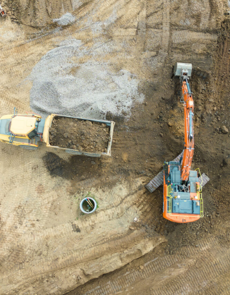Benefits of Using ERP in the Construction Industry – Reviewing The Pros and Cons Of An ERP System
In this article we will review the advantages and disadvantages of adopting ERP within a construction business.
What is an ERP System?
ERP (Enterprise Resource Planning) software is a solution that integrates and manages core business processes within a single platform.
Processes managed through an ERP system include:
- Project management
- Supply chain management and procurement
- Financial management
- Asset, equipment and materials management
- Workforce management – HR and payroll
- Field service management
ERP connects all of your teams across your business, and provides one view to all stakeholders across the business in real-time.
The ERP market is growing and is projected to reach $117.9 billion by 2030, driven by the adoption of cloud and mobile applications.
Adoption is also growing across the fragmented construction industry to help increase efficiency and protect profit margins.
This article will review the advantages and disadvantages of adopting ERP within a construction business.
What Is ERP In The Construction Industry?
The construction industry has traditionally been slow to adopt new technologies, but ERP platforms are particularly suited to the construction industry as construction is a fragmented process which combines lots of elements, teams and processes.
ERP has grown in popularity in construction because it coordinates those disparate elements together in one system, which helps improve CVR (cost value reconciliation) and avoids rework in construction projects.
Construction businesses range from small specialist subcontractors to large enterprise contractors, and ERP solutions are similarly diverse.
The benefits of construction ERP are common across the different sizes of construction companies, but choosing and implementing the right ERP also presents many challenges.

8 Key Benefits of ERP in the Construction Industry
- Reduce costs
- Increase productivity
- Enhance collaboration
- Link the field to the office
- Avoid mistakes, delays and rework
- Helps your construction company scale up
- Gives managers the power to make data-driven decisions
- Improve client relationships
Reduce and Control Costs
Rising costs are one of the major issues in construction, but using ERP means businesses have better visibility of projects to manage resources, demand and capacity. This gives construction companies a clear picture of where their money is going, allowing them to identify areas for improvement and make informed decisions about resource allocation.
Advanced ERP also has the ability to analyze historical project data and identify trends to help with cost forecasting. This helps construction companies generate more accurate cost estimates for future projects, reducing the risk of cost overruns.
Having access to accurate, real-time data on construction projects can also help with material costs and buying decisions.
Total visibility and enhanced collaboration also helps construction companies cut waste costs and the spiraling costs that come with errors and rework.
Increase Productivity
Construction has faced a productivity crisis for decades, and ERP can help construction companies boost productivity rates across every team.
ERP creates a central hub for all project data, eliminating the need for manual data entry and paper-based processes. ERP also automates repetitive tasks like scheduling, material requisitions, and reporting This reduces duplication of effort and frees up valuable time for workers to focus on higher-value tasks.
ERP also increases productivity on the field. Modern ERP systems often use mobile apps, allowing workers to access project data and updates on-the-go. This improves decision-making at the job site and eliminates delays caused by waiting for information back at the office.
ERP helps with resource allocation by providing insights into equipment availability, labor skills, and material stock levels. This ensures the right resources are available at the right time, minimizing downtime and maximizing productivity.
Enhance Collaboration
Collaboration is essential for keeping construction teams on-track, and enabling your teams to have access to all relevant data and files 24/7 from anywhere results in increased efficiency in project planning and delivery.
Using an ERP system helps construction teams extract all relevant information so nothing is overlooked during the planning and costing of projects whether teams are on site, in an office or working from home.
ERP provides real-time data on project progress, resource allocation, and potential challenges. This allows different teams (design, engineering, procurement, construction) to see the bigger picture and understand how their work impacts other aspects of the project. This fosters better coordination and proactive problem-solving.
This ease of collaboration allows teams to quickly handle any issue which may arise during the project.
Link Field to Office
ERP uses cloud technology and mobile access to link the field to the back office, breaking down information silos and getting work done faster.
With a unified system, data is entered once and accessible to all. This eliminates discrepancies and misunderstandings that can lead to costly mistakes and rework. Field crews have access to up-to-date plans and specifications, reducing the risk of errors due to outdated information.
Real-time data from the field, such as labor hours, material usage, and equipment performance, is readily available to the back office. This empowers project managers to make data-driven decisions on resource allocation, budgeting, and project scheduling.
Access Coins is the all-in-one ERP built for construction
Collaborate, control and connect with Access Coins – track all aspects of the construction lifecycle from a single source of truth. Book a demo with one of our construction technology experts.
Manage Risk - Avoid Mistakes, Delays and Rework
48% of costly rework in construction can be chalked down to poor communication. Poor communication in construction can be down to different teams working within different systems, a problem which is resolved with an ERP system.
Another leading cause of rework is poor coordination between teams covering different parts of a project. Design errors spotted too late, incorrect materials or a poorly coordinated labor force can lead to construction mistakes which in turn will result in dreaded delays and rework.
An ERP system allows leaders to identify issues early, provides a central environment for communication and coordinates teams to help reduce the amount of rework on a project.
Many ERP systems offer risk management modules that allow for risk assessment, mitigation plan creation, and tracking. By proactively identifying potential risks and developing contingency plans, construction companies can minimize the impact of unforeseen events.
Centralized document management, incident reporting and contract management also all contribute to managing and avoiding risks in construction projects.
Scalability
Standardizing processes and procedures across different projects and locations helps construction businesses operate more efficiently and increase productivity. By automating manual processes such as scheduling and data entry, construction staff will be able to focus on more valuable tasks such as planning, taking on more work and scaling up a construction business.
An advanced construction ERP also scales with construction companies as they grow, meaning it is a future-proof investment.
Improve Construction Project Management
Project management in construction can be a hugely complex task, overlooking many moving parts. ERP can act as the central system within your company, giving project managers the tools they need to do their job better.
ERP allows for creating detailed project plans, assigning tasks and allocating resources. It helps identify potential bottlenecks and adjust schedules accordingly, keeping projects on track. It also automates repetitive tasks such as document approvals, material requisitions, and progress reports. This frees up valuable time for project managers and allows them to focus on more strategic tasks.
Real-time data on project progress, resource utilization and potential delays allows project managers to identify issues early, make informed decisions, and take corrective actions quickly.
Make Data-Driven Decisions
ERP gives construction businesses all the data and information they need at their fingertips, organized in a way which is easy to understand and analyze. By analyzing historical data on project costs, resource allocation, and labor productivity, companies can identify areas for improvement.
This data-driven approach helps optimize workflows, minimize waste, and make informed decisions that lead to cost savings and increased efficiency.
This visibility provides real-time data and analytics so managers can not only monitor and track performance across the business, but make more informed and data-driven decisions.
In a competitive industry, data-driven companies have an edge. By leveraging data for better decision-making, construction firms can optimize processes, reduce costs, and deliver high-quality projects faster, giving them a competitive advantage in securing bids.
Improve Client Relationships
ERP systems can play a crucial role in fostering stronger client relationships within the construction industry. By promoting transparency, communication, collaboration, and data-driven decision making, ERP empowers construction companies to deliver exceptional customer service, manage projects effectively, and ultimately build trust and satisfaction with their clients.
Clients can be granted access to a client portal within the ERP system, allowing them to view real-time project progress, documents, and updates. This transparency fosters trust and keeps clients informed, reducing misunderstandings and frustrations.
ERP also facilitates communication between the construction company and the client. Features like document sharing and progress reports within the ERP system streamline communication and collaboration with clients. Clients can easily submit questions, request clarifications, or track changes, leading to a more collaborative and productive working relationship.
Download our Buyer’s Guide to Construction Management Software here >

5 Cons of ERP In The Construction Industry
- Initial costs
- Customisation
- Training and training costs
- Slow implementation process
- Needs buy-in across your team
Initial Costs
When starting to compare costs of ERP solutions, you need to consider not only the cost of the solution but additional costs such as training and hosting to ensure a smooth transition across your company.
ERP is a major investment and will require change management across your business. Construction leaders will need to consider how their existing IT infrastructure will need to adapt to and migrate to ERP.
Customisation
When considering ERP for a construction business, users will need to compare ‘out of the box’ solutions vs customisation needed for their specific operations.
Many ERP solutions are standardised which can limit their ability to meet your specific needs. Users will need to work with the chosen vendor to understand if they need customisation and how much is required.
Bear in mind that in a recent report, most ERP implementations cost three to four times than what was initially budgeted. 65% of the time, required customisation was the key culprit.
Training Is Needed
Like all software, ERP will need training across a team. It is worth considering what training is included as part of a vendor’s ERP package and, if so, what is covered? If basic training is included, will this meet your requirements and include all users? Will you need more intermediate/advanced training for your team and, if yes, what is the additional cost?
Work with the ERP vendor and your stakeholders to outline a clear training plan for deployment across your business. For your ERP solution to be successful, all users need to understand the new processes and impact.
Slow Implementation Process
Implementation is more than just switching to a new software system. ERP will impact many functions across a business, which means implementation is rolled out in multiple phases.
One of the many challenges for companies moving to ERP is not setting realistic expectations, time frames and milestones as part of the implementation process.
Construction projects can be complex, with requirements changing as the project progresses, and a construction ERP will need to be able to handle these. Data is critical to the success of your ERP solution, but data may be currently stored within paper-based systems. Construction companies need to consider if they have built in enough time for data integration, including validation and cleaning of data.
Finally, your ERP implementation should not be viewed as a one-off effort which ends when the new system goes live. To stay competitive, a construction businesses’ ERP should continue to evolve to support a growing business.
Needs Buy-In Across Teams
The decision-making process of buying an ERP solution needs buy-in from key stakeholders across a construction business. Teams need to be clear on what challenges they are looking to solve. ERP requires a shift in mindset and a change in everyday work processes for many employees.
Learn More About Access Coins, Our Dedicated Construction ERP Software
As you can see, construction ERP offers specialized features like advanced project management, job costing, compliance tracking, and real-time analytics tailored specifically for the construction industry. These capabilities enable construction companies to streamline operations, reduce costs, mitigate risks, and make informed, data-driven decisions.
Choosing dedicated construction ERP software like Access Coins ensures that your business benefits from industry-specific functionalities designed to enhance efficiency and profitability. To discover how Coins can empower your construction projects, visit our Construction ERP page for more information.



